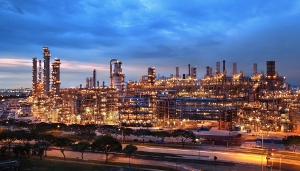ExxonMobil Chemical announced today that it will build facilities to manufacture premium halobutyl rubber and Escorez hydrogenated hydrocarbon resin at its recently expanded petrochemical complex in Singapore. Engineering and procurement activities have begun, with construction expected to begin in the second half of 2014 and completion anticipated in 2017.
 ExxonMobil Chemical will build facilities to manufacture premium halobutyl rubber and Escorez hydrogenated hydrocarbon resin at its recently expanded petrochemical complex in Singapore. (Photo: Business Wire)
ExxonMobil Chemical will build facilities to manufacture premium halobutyl rubber and Escorez hydrogenated hydrocarbon resin at its recently expanded petrochemical complex in Singapore. (Photo: Business Wire)
The company is a major supplier of halobutyl rubber to the global tire industry, and this expansion project will add production capacity of 140,000 tons per year. The hydrogenated hydrocarbon resin production unit will be the world’s largest, with a capacity of 90,000 tons per year, to meet long-term demand growth for hot-melt adhesives.
“Our expanded steam cracking capability at Singapore provides a platform for growth through a wide range of petrochemical building blocks that can be further upgraded to specialty products,” said Steve Pryor, president, ExxonMobil Chemical Company. “We continue to invest in expanding capacity at our strategic hub in Singapore, which is an ideal location to efficiently serve the fast growing Asia Pacific market.”
With 75 years of experience in butyl rubber production and sales, ExxonMobil’s halobutyl products provide outstanding air retention for tires. According to ExxonMobil’s Energy Outlook, the global number of cars and light trucks is expected to double by 2040 to 1.7 billion vehicles, which supports much of the growth expected for halobutyl rubber.
Since the 1970s, ExxonMobil has been an industry leader in process technologies and capacity expansions of specialty tackifiers and polymers for the adhesives industry. Hydrogenated tackifier demand is expected to double over the next 15 years. Much of the growth is anticipated in Asia, where packaging, woodworking and nonwovens manufacturers increasingly use hot melt adhesives.